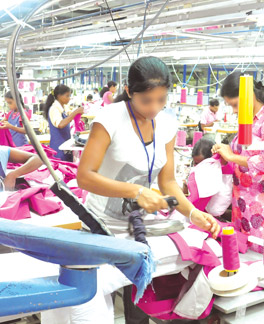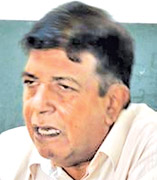|
A crying need for protective arm:
Are labour laws not for FTZ workers?
by Isuri Yasasmin Kaviratne
The lives of the young men and women working in Sri Lanka's Free
Trade Zones (FTZs) or Export Processing Zones have been written about,
analyzed and dissected since the establishment of these Zones in 1978.
The workers in these vast export business parks are not covered by the
island's otherwise stringent labour laws. Union activity is restricted
and the enforcement of regulations covering overtime and minimum wage is
lax.
In the wake of May Day, which highlights the issues faced by workers
the Sunday Observer visited the FTZ in Katunayake where over 50,000 men
and women are employed, in nearly 85 factories.
The stories of the FTZ employees vary, according to their gender,
age, ethnicity, the factory, and the area they live in. However, to
protect their identities, and to give a clear picture of their problems,
we have selected a handful of workers to represent and highlight the
problems faced by the thousands of workers.
Only sixteen
Sumedha had just turned 16 when she came from Jaffna with her cousin
to work in the Free Trade Zone. Her father is no more and her mother
needed constant medical care. To find cash to support her mother and
herself, her options were rather limited. According to her, living and
working in Jaffna would have been far worse than working in the FTZ,
where she earns a salary of Rs. 14,000. She expects an increment of
between one to two thousand rupees after her probation period is over.
Legally, she is permitted to do 60 hours of work a week, including
overtime, but there are times she claims, when she has to work more than
100 hours a week.
"What happens is, we are instructed to punch the card to sign out
after two hours of overtime, but continue to work until the target for
the day is met," she said.
The problem here is twofold. First, Sumedha is not being paid for the
extra hours she puts in and second, she is 16.
According to the Factories Ordinance No 45 of 1942 Sri Lanka those
below the age of 18 should not be called upon to work from 6.00pm -
6.00am, should not work more than 60 hours per week and the work should
not entail any hazardous activities.
 In reality, there are many young people working in FTZs, some younger
than Sumedha. They are simply paid an 'allowance' so that there's no
official record of their employment and they are asked to stay away when
buyers or the Labour Department Officials are scheduled to visit. In reality, there are many young people working in FTZs, some younger
than Sumedha. They are simply paid an 'allowance' so that there's no
official record of their employment and they are asked to stay away when
buyers or the Labour Department Officials are scheduled to visit.
Youth from Jaffna
Anandi, and Suresh too are from the Northern Province, just as
Sumedha. It has become an increasingly common feature in the FTZ, since
the long hours and relatively low pay does not attract workers from the
South. As a result the youth from the war affected areas in the North
are taking up more positions in the FTZs. In addition to the difficult
working conditions they face the additional problem of language.
"All the documents are either in Sinhala or English, even those on
the office Notice Board. Even if we are asked to step out of the
building in an emergency, we wouldn't understand, at least not pronto,"
said Suresh, 24, working in a factory in the ironing section.
Suresh claims that other than the language barrier there isn't any
racial discrimination within the FTZ, for the Tamils, due to their
reputation for hard-work, and the eagerness of the recruiters to attract
northern workers. They are sometimes paid more than their Sinhala
counterparts.
According to Suresh, private recruitment agencies often have two
different salary scales for the Sinhalese and Tamil employees. The Tamil
employees are paid Rs. 18,000 per month whereas the Sinhala employees
are paid Rs. 14,000 a month for the same position.
"There are no fights, but there is resentment," he said.
While the wage scales for the Tamil workers are higher they also face
the risk of extortion. "Sometimes people pretending to be from the army
and CID have asked for our documents and extorted money from us. We
didn't complain because they looked authoritative." said Anandi, 26, a
machine operator.
Employees from the North often lack knowledge of the legal system and
their rights. In fact, only uniformed police officers, and not the army
or the CID can demand identification.
Sexual harassment
Of course, ethnicity is far from being the only source of division,
while gender also plays as a stark dividing line. Female employees
endure lower wage scales and often find themselves prey to advances from
their superiors. Even peer level male colleagues often pressure women to
grant sexual favours. Unwanted advances, physical and verbal harassment
are common features. Recruiters for brothels and quasi-legal massage
parlors also stroll the FTZs looking for women in need of extra income.
Working12 hour shifts away from the protection of home and family,
many women leave their dormitories before dawn and return after dark,
thus making them particularly vulnerable.
Trade Union activities
"The street harassment is the worst part," said Mauri, 23, a machine
operator. "Men call us, manhandle us, often they are on bikes, so
there's nothing we can do." She explained that family commitments and
responsibilities of children are keeping them in this job, despite the
harassments they face.
Many workers believe stronger Trade Unions within the FTZs would help
resolve their difficulties.
But the absence or near absence of Trade Unions is a defining feature
of the FTZs. It is the reason these areas are attractive to investors.
Union activity is often penalized by employers.
Sandun, 29, a senior machine operator, said he and a group of
employees lost their jobs because they started a Trade Union.
"Our pay date changes every few months, sometimes it's the 1st,
sometimes the 20th. We've seen insects in the food they provide us at
the factory.
There are pregnant women who are compelled to work on 12 hour shifts,
standing. We are asked to work on Poya days. There are many more
problems," he said.
While some factories have counsels where employees are represented,
Sandun claims that these are manned by the most compliant workers. It's
they who speak on behalf of the workers to the major buyers.
Buyers such as Nike, Polo and other famous brands have policies on
workers' health and working conditions they are obliged to adhere to.
The reality of the situation is, the FTZs would challenge these
conditions. However, Sandun and the others in union activity opined that
few workers are prepared to speak out.
"The reality is that if these conditions were made public, the
factories would lose their orders, and we would all lose our jobs. So we
are afraid, its better to be employed in poor conditions rather than
being unemployed. That is the attitude of many," he said.
Pix by Shan Rambukwella
[Wages low, security minimal]
 The labour laws in the country should apply to the Free Trade Zone (FTZ)
as well, President of the United Federation of Labourers, Linus
Jayathilake said. Initially, it was said the general law in the country
does not apply to the FTZ which functions according to the guidelines
set out by the Board of Investment. However, the Trade Unions (TU) filed
a court case against it in the early 1980s, and the Supreme Court ruled
that the labour laws in the country apply to the FTZ as well. The labour laws in the country should apply to the Free Trade Zone (FTZ)
as well, President of the United Federation of Labourers, Linus
Jayathilake said. Initially, it was said the general law in the country
does not apply to the FTZ which functions according to the guidelines
set out by the Board of Investment. However, the Trade Unions (TU) filed
a court case against it in the early 1980s, and the Supreme Court ruled
that the labour laws in the country apply to the FTZ as well.
"That's why the Labour Department pays monitoring visits to the
Zone." However, he added in practice, these laws are not being employed
at all and neither the TUs nor the employees are allowed to take action.
The 12 employees fired from Smart1 Factory for forming a Trade Union
is not legal. But the factory owners have given various reasons for
their dismissal. The factory representatives had also refused to attend
the first round of discussions held by the Labour Department. "The wages
are low, the job security minimal, and the working conditions abysmal.
But the factory owners are unaffected," he said.
|

